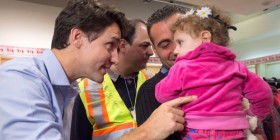Canada has set aside its former cherished international position as self-proclaimed peacekeeper, and now has an opportunity to graduate from the Harper government’s more commendable but still unsatisfactory status as a mouse that roars, to some level of international relevance.
Canada was a good ally in the World Wars and as a co-founder of the North Atlantic Treaty Organization. The notion of peacekeeping took hold in 1956, after the British and French had adopted the insane scheme of encouraging Israel to invade the Egyptian Sinai and proceed to the Suez Canal, which Egypt’s President Nasser had just seized from the Suez Canal Company, owned by Britain and France. For the next 40 years, there was a fluctuating but imperishable attachment by Canadian governments of both parties to the concept of peacekeeping under U.N. auspices. Even as the United Nations became a steadily more disreputable sinkhole of corruption and hypocrisy where a vast coalition of poor and despotic countries squandered and embezzled the international organization’s budget, and peace-keeping itself degenerated into poor countries renting out their peacekeepers, paid for by the advanced countries of the UN, as mercenaries to factions in civil wars, Canada subscribed to the fraud that their country was a halcyon with a talent for calming troubled areas.
Canadian forces almost always performed well, but it was almost all a mirage — a convenient posture for the Trudeau and Chrétien governments, especially, to shrink the defence budget as a percentage of the whole budget and of GDP, while unctuously pledging the country’s allegiance to the highest purposes of international law. Even the fiasco of the international peace-keeping force in Bosnia, and the misdeeds of a number of Canadians in the peace-keeping debacle in Somalia, did not disillusion this country about peace-keeping. In general, and as both those episodes demonstrated, where there is peace, you don’t need peacekeepers, and where there is war, they are of no use.
Fortunately, Stephen Harper has had little time for this pretentious humbug centred on the United Nations. He renounced the longstanding Canadian ambivalent relativism between Israel and the Arab terrorists bent on the Jewish state’s complete destruction. The Prime Minister also has been commendably robust about sanctions on Iran, and in condemnation of the Russian role in Syria and its attempt to intimidate Ukraine.
Unfortunately, the other half of the promised Harper national security policy has not been delivered: The reversal of many years of neglect of the defence budget has continued and we now have an army of just three brigades, 15,000 men, and are approaching a three-ocean navy of just 15 ships, while the number of new warplanes to be acquired steadily shrinks as the unsuspected increase in their unit cost skyrockets.






Leave a reply